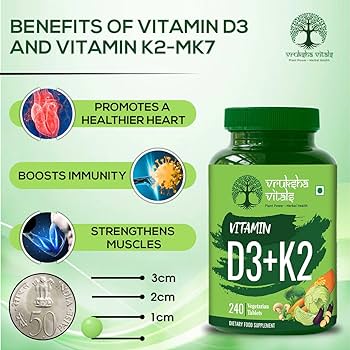The Benefits of Vitamin D and K2
Welcome to our comprehensive guide on the benefits of vitamin D and K2. In this article, we will explore the numerous advantages these essential vitamins offer to our overall health and well-being.
The Importance of Vitamin D
Vitamin D, often referred to as the “sunshine vitamin,” plays a crucial role in maintaining optimal health. It is primarily synthesized in our skin when exposed to sunlight. However, many people do not receive enough sunlight or have limited sun exposure, leading to a deficiency in this vital vitamin.
Stronger Bones
Vitamin D is essential for calcium absorption, which is necessary for maintaining strong and healthy bones. It helps regulate calcium and phosphorus levels in the blood, promoting the growth and mineralization of bones. This, in turn, reduces the risk of fractures and osteoporosis.
Enhanced Immune System
Research suggests that vitamin D plays a crucial role in supporting a healthy immune system. It helps regulate immune responses, reduces inflammation, and enhances the function of immune cells. Adequate levels of vitamin D can potentially lower the risk of autoimmune diseases and infections.
Reduced Risk of Chronic Diseases
Studies have shown that maintaining optimal vitamin D levels may help reduce the risk of chronic diseases such as heart disease, diabetes, and certain types of cancer. Vitamin D has been linked to improved cardiovascular health, better insulin sensitivity, and potential anti-cancer properties.
The Power of Vitamin K2
Vitamin K2, also known as menaquinone, works synergistically with vitamin D to provide numerous health benefits. It is less commonly found in the diet compared to vitamin K1, but its importance should not be underestimated.
Bone Health
Vitamin K2 plays a crucial role in bone metabolism and health. It activates specific proteins that help regulate calcium deposition in bones and prevent calcium from accumulating in arteries and soft tissues. This mechanism ensures that calcium is properly utilized in bone mineralization, reducing the risk of osteoporosis and arterial calcification.
Heart Health
Research suggests that vitamin K2 may promote cardiovascular health by preventing the calcification of arteries. By ensuring calcium is directed towards bones and teeth rather than arteries, vitamin K2 helps maintain the flexibility and integrity of blood vessels, reducing the risk of heart disease.
Dental Health
Vitamin K2 also plays a role in maintaining optimal dental health. It helps ensure proper mineralization of teeth, promoting strong and healthy tooth enamel. Additionally, vitamin K2 may aid in preventing tooth decay and gum disease.

Vitamin D and K2 are two essential vitamins that offer a wide range of benefits for our overall health and well-being. From promoting strong bones and a healthy immune system to reducing the risk of chronic diseases, these vitamins play crucial roles in our body’s functioning. By incorporating adequate amounts of vitamin D and K2 into our diet or through supplementation, we can optimize our health and potentially improve our overall quality of life.
Frequently Asked Questions about the Benefits of Vitamin D and K2
1. What are the benefits of vitamin D and K2?
Vitamin D helps in calcium absorption, bone health, immune system support, and reducing inflammation. Vitamin K2 supports bone health, and heart health, and helps prevent calcification of arteries.
2. How can vitamin D benefit bone health?
Vitamin D helps in the absorption of calcium, which is essential for maintaining strong and healthy bones. It also aids in regulating calcium levels in the blood.
3. Can vitamin D and K2 help prevent osteoporosis?
Yes, both vitamin D and K2 play a crucial role in bone health by promoting the deposition of calcium in the bones and preventing its accumulation in the arteries.
4. Are there any immune system benefits of vitamin D and K2?
Vitamin D and K2 both support the immune system by regulating immune responses, enhancing the function of immune cells, and reducing the risk of autoimmune diseases.
5. How do vitamin D and K2 contribute to heart health?
Vitamin D and K2 work together to support heart health by preventing the calcification of arteries, reducing the risk of arterial stiffness, and improving overall cardiovascular function.
6. Can vitamin D and K2 reduce inflammation?
Yes, both vitamin D and K2 have anti-inflammatory properties that help in reducing inflammation in the body, which is beneficial for various health conditions.
7. What are the natural sources of vitamin D and K2?
Vitamin D can be obtained from sunlight exposure, fatty fish, fortified dairy products, and egg yolks. Vitamin K2 is found in fermented foods, organ meats, and certain cheeses.
8. Are there any risks of vitamin D and K2 deficiency?
Deficiency of vitamin D can lead to weakened bones, increased risk of fractures, muscle weakness, and compromised immune function. Vitamin K2 deficiency may contribute to poor bone health and increased rian sk of cardiovascular diseases.
9. Can vitamin D and K2 be taken together as supplements?
Yes, vitamin D and K2 supplements are often combined as they work synergistically to provide optimal benefits for bone health, heart health, and overall wellness.
10. What is the recommended daily intake of vitamin D and K2?
The recommended daily intake of vitamin D varies depending on age and individual needs. Generally, adults need around 600-800 IU (International Units) of vitamin D per day. For vitamin K2, the recommended intake is about 90-120 mcg (micrograms) per day.




